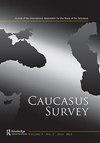The EU’s neighbourhood policy towards the South Caucasus: expanding the European security community
IF 0.5
Q3 AREA STUDIES
引用次数: 6
Abstract
focuses on the old propaganda slogan, the “Friendship of Nations” – now cynically devoid of any meaning. The chapter revives it by infusing it with real-life experiences, memories and understandings of Soviet migrants and Soviet citizens. Wistfulness does not give way to a blind nostalgia, as Sahadeo’s interviewees keep the narrative in place by astute comments comparing the friendship to that “of Robinson [Crusoe] and Friday” (p. 59). Chapter 3 focuses on place making practices, ambivalent welcome, and settling in. It tells the story of new beginnings, gender relations, cultural adaptions in spaces that officially lacked any form of social or ethnic segregation, but deep down were perfectly segregated (p. 91). Chapter 4 reveals how a Western concept of “race” will not do to explain the intersectionality of subordination experienced by “southern” migrants, and how ethnicity, nationality, social class, gender and social position help to revaluate and open up the discourse of Russian “racism”. Chapter 5 demonstrates the different forms, modalities and experiences of belonging in Soviet Moscow and St Petersburg and becoming svoi via personal networks or work collectives. Chapter 6 reviews the organizing analytical themes of the book – the journey, early adaptation, social mobility, links with home – through the lens of personal stories of four different traders, while Chapter 7 gives a migrant perspective to the turbulent years of perestroika, rising ethnic and linguistic tensions fuelled by extremist politics, volatile economics and bewildering legislation, as the Soviet period drew to a close. In sum, Sahadeo’s excellent book writes the much-needed pre-history, indeed prequel, to contemporary labour migration into Russia’s European cities, and firmly situates late Soviet migration as an intrinsic element of global change and development.欧盟对南高加索地区的周边政策:扩大欧洲安全共同体
把注意力集中在旧的宣传口号上,“各国的友谊”——现在愤世嫉俗地没有任何意义。这一章通过注入对苏联移民和苏联公民的真实经历、记忆和理解,使它重新焕发活力。伤感并没有让位于盲目的怀旧,因为Sahadeo的受访者通过将友谊与“鲁滨逊[克鲁索]和星期五”(第59页)进行比较,巧妙地将叙述保持在适当的位置。第三章重点讨论了场所制作实践、矛盾欢迎和安顿。它讲述了一个新的开始,性别关系,文化适应的故事,在没有任何形式的社会或种族隔离的空间,但在内心深处是完全隔离的(第91页)。第四章揭示了西方的“种族”概念如何无法解释“南方”移民所经历的从属关系,以及种族、国籍、社会阶级、性别和社会地位如何有助于重新评估和打开俄罗斯的“种族主义”话语。第五章展示了归属于苏联莫斯科和圣彼得堡的不同形式、模式和经验,并通过个人网络或工作集体成为svoi。第六章通过四个不同商人的个人故事,回顾了本书的组织分析主题——旅程、早期适应、社会流动、与家乡的联系。第七章从移民的角度审视了动荡的改革年代,极端主义政治加剧了种族和语言的紧张关系,动荡的经济和令人困惑的立法,苏联时期即将结束。总而言之,Sahadeo这本优秀的书为当代俄罗斯欧洲城市的劳动力迁移提供了急需的史前史,实际上是前传,并坚定地将苏联晚期的移民视为全球变化和发展的内在因素。
本文章由计算机程序翻译,如有差异,请以英文原文为准。
求助全文
约1分钟内获得全文
求助全文
来源期刊

Caucasus Survey
Arts and Humanities-History
CiteScore
1.30
自引率
9.10%
发文量
4
期刊介绍:
Caucasus Survey is a new peer-reviewed, multidisciplinary and independent journal, concerned with the study of the Caucasus – the independent republics of Armenia, Azerbaijan and Georgia, de facto entities in the area and the North Caucasian republics and regions of the Russian Federation. Also covered are issues relating to the Republic of Kalmykia, Crimea, the Cossacks, Nogays, and Caucasian diasporas. Caucasus Survey aims to advance an area studies tradition in the humanities and social sciences about and from the Caucasus, connecting this tradition with core disciplinary concerns in the fields of history, political science, sociology, anthropology, cultural and religious studies, economics, political geography and demography, security, war and peace studies, and social psychology. Research enhancing understanding of the region’s conflicts and relations between the Russian Federation and the Caucasus, internationally and domestically with regard to the North Caucasus, features high in our concerns.
 求助内容:
求助内容: 应助结果提醒方式:
应助结果提醒方式:


